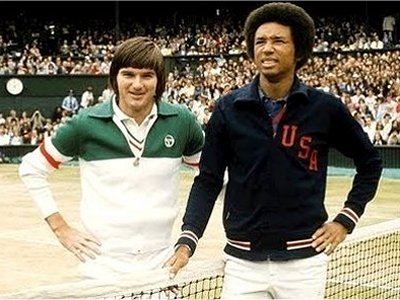
WHY THE WIMBLEDON 1975 MEN’S FINAL HAS A MESSAGE FOR THE SPEED ADDICTED
Whether it is writing in the dust or lobbing over the net, there is wisdom in taking our time over the Cup Final decisions for which we will be remembered.
Back in 2006, the British Council carried out research on how quickly people hurry about their lives. Previous studies have shown that the more advanced and urbanised the population, the quicker people walk. More social, less individualised cultures go about their business more slowly, as evidenced in a study from 1996.
The British Council research was stunning. Over the course of a decade, people had begun to walk 10% faster. This applied not just in western societies, but to the newly industrialising cities of East Asia. If a one hundred metres sprinter had quickened from 10 seconds to 9 seconds, everyone would guess banned drugs had been involved. We are visibly speeding up at unsustainable rates.
Robert Colvile’s stimulating book The Great Acceleration: how the world is getting faster faster (Bloomsbury, 2016) gives an entertaining overview of how this is happening. His thesis is not doom-laden and perceives the benefits speed has brought to our lives, not least by accessible information, but there are inherent risks. The financial world, governed largely by algorithm, transacts at lightening pace and is prone to alarming surges, as seen in the flash crash of 2010. Where this leads is hard to say, but there is an incipient fragility in a system coded by human beings.
We worship the technology we have and as we become like the things we worship, we get faster too. And we expect the people around us to match our pace.
Decision making follows this trend, unhelpfully. Public policy is rarely allowed to germinate after patient reflection and analysis, but is increasingly made up to satisfy short-term news cycles that shore up a government’s poll ratings. This insidious effect, thus sanctified, puts pressure on all public leaders to show quick, decisive thinking which easily segues into making it up as they go along.
In his public life, Jesus was endlessly pushed to make statements and answer questions at the whim of others. The account of the woman caught in adultery in John 8 was a shameless attempt to use a woman to invalidate his ministry. The law was unsparing: would Jesus endorse it? And if he didn’t, how could he claim to uphold it? The story says: ‘Jesus bent down and wrote with his finger on the ground’. After this pause, he produces this killer response which has reverberated through history: ‘Let anyone among you who is without sin be the first to throw a stone at her’. And then it says: ‘once again he bent down and wrote on the ground’.
Why include within the story this strange, incidental detail? John’s Gospel does not give us an answer to this, so we can never be sure, but in the context one can see how it might have afforded two things: to take the heat out of a volatile situation where a woman’s life was at risk and to give Jesus time to think. When highly-charged events occur in life, our minds are often, curiously, drawn to the small incidental details which surround it. It is as if Jesus consciously used this inclination to slow things down.
Deliberative thought is essential in decision-making. We should resist the assumption of an accelerating culture that unless we mimic its pace we cannot survive in its wake. Speed is assuming an almost ethical dimension. As computers grow more sophisticated, responsive and life-like, our credulity is tested. The need to shape this rush round a mellow core of reflective wisdom is the most pressing challenge.
In 1975, an ageing Arthur Ashe played the young, thrusting Jimmy Connors in a final most saw only one possible outcome from. Ashe’s victory in four sets remains one of Wimbledon’s biggest upsets and it was predicated on a specific game plan. Ashe could not match Connors for speed and power, so there was no point playing him at his own game. Instead, he devised a slow, low game with plenty of soft returns which reduced the match to the speed he desired. Connors was perplexed and constantly over-hit the ball in an effort to return the final to the speed he was accustomed to, losing the first two astonishing sets 6-1, 6-1 after which there was no return.
Speed is convenient and empowering to many, but not all, and it does not have inherent ethical value. Whether it is writing in the dust or lobbing over the net, there is wisdom in taking our time over the Cup Final decisions for which we will be remembered.
POPULAR ARTICLES

Obama's Covert Wars
The use of drones is going to change warfare out of all recognition in the next decades.

Through A Glass Starkly
Images of traumatic incidents caught on mobile phone can be put to remarkable effect.

What Are British Values?
Is there a British identity and if so, what has shaped the values and institutions that form it?


